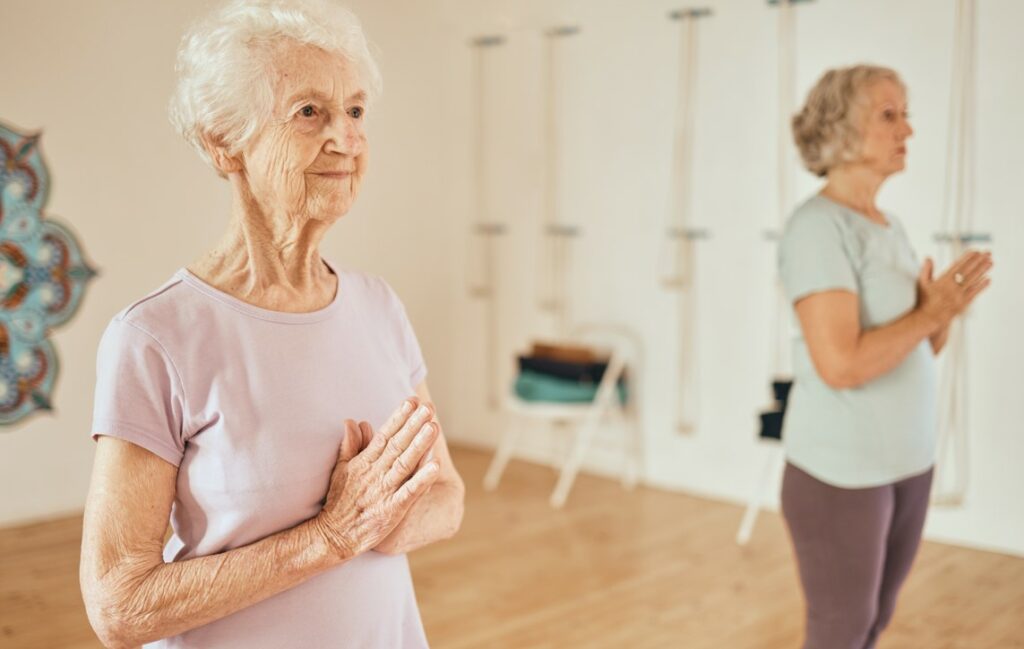As we journey through the later stages of life, maintaining our physical health, mental clarity, and emotional well-being becomes increasingly important. Like many of you, I’ve sought ways to embrace aging gracefully and healthily. One powerful tool that has consistently proven to be a steadfast ally in this endeavor is mindfulness.
Mindfulness, at its core, is the practice of being fully present and engaged in the current moment, with a gentle and non-judgmental awareness of our thoughts, feelings, and surroundings. This simple yet profound practice can have transformative effects on our overall health and quality of life as we age.
Why Mindfulness Could Be the Best Ally for Seniors?
- Reduction of Stress and Anxiety: As we age, it’s common to face significant life changes, such as retirement, the loss of loved ones, and health issues. Mindfulness helps manage these changes by reducing stress and anxiety levels. By focusing on the present moment, we can avoid ruminating on the past and excessively worrying about the future, allowing us to live more peacefully and with less distress.
- Improvement in Mental and Emotional Health: Regular mindfulness practice can enhance our emotional well-being by fostering an attitude of acceptance and self-compassion. This is especially important for seniors as we face the realities of physical decline and other challenges associated with aging. Mindfulness helps us accept these changes with serenity and grace.
- Increased Cognitive Resilience: Numerous studies have shown that mindfulness can help maintain and even improve cognitive function in older adults. Practicing mindfulness can strengthen brain areas related to memory, concentration, and decision-making, which is crucial for staying mentally sharp and active.
- Better Physical Health: Mindfulness can have positive effects on our physical health. It can lower blood pressure, improve sleep quality, and help manage chronic pain, conditions that are common in older age. By adopting a regular mindfulness practice, we can significantly support our physical well-being.
How Mindfulness Could Be the Best Ally for Seniors?
- Conscious Breathing Practices: Simply taking a few minutes each day to focus on breathing can be a powerful tool. Deep, mindful breathing helps calm the nervous system, reducing stress and promoting relaxation.
- Guided Meditation: Many guided meditations are specifically designed for seniors. These meditations can focus on themes such as gratitude, compassion, and acceptance, helping us cultivate a positive and resilient mindset.
- Incorporating Mindfulness into Daily Activities: Practicing mindfulness doesn’t necessarily require additional time. We can incorporate mindfulness into our daily activities, such as eating, walking, or even cleaning. By doing these activities with full awareness, we can find more pleasure and meaning in our daily routines.
- Participating in Mindfulness Groups: Joining a mindfulness group can provide a sense of community and support. Sharing the practice with others can enrich our experience and motivate us to continue practicing regularly.
- Using Apps and Online Resources: There are numerous apps and online resources designed to help individuals start and maintain a mindfulness practice. These tools can be especially useful for those who prefer to learn and practice from the comfort of their homes.
Mindfulness not only helps us live more peacefully and happily but also provides the necessary tools to face the challenges of aging with strength and wisdom.

Getting Started with Mindfulness: A Guide for Seniors
As we embrace the later stages of life, incorporating mindfulness into our daily routines can greatly enhance our overall well-being. Here’s a guide to help you get started with mindfulness and integrate it into your life:
- Start Small and Simple
Begin with short, manageable sessions. Even five minutes a day can make a significant difference. You don’t need any special equipment—just find a quiet, comfortable place to sit.
Tip: Set a timer for 5 minutes and focus on your breath. Inhale deeply through your nose, hold for a moment, and exhale slowly through your mouth. Repeat this process, allowing yourself to relax more with each breath.
- Use Guided Meditations
Guided meditations can be especially helpful for beginners. These sessions are led by an instructor who guides you through the meditation, making it easier to stay focused.
Tip: Look for guided meditation apps or videos specifically designed for seniors. Some popular apps include Headspace, Calm, and Insight Timer. These often have free trials or free content to get you started.
- Incorporate Mindfulness into Daily Activities
You don’t have to set aside special time for mindfulness. You can practice it during your regular activities by focusing fully on what you are doing.
Tip: When eating, take time to notice the flavors, textures, and aromas of your food. Eat slowly and savor each bite. When walking, pay attention to the feeling of your feet touching the ground and the rhythm of your steps.
- Join a Mindfulness Group
Being part of a group can provide support and motivation. Many communities and senior centers offer mindfulness classes or meditation groups.
Tip: Check with local community centers, senior centers, or online forums to find a group that meets your needs. Participating in a group can also provide social interaction, which is beneficial for mental health.
- Practice Gratitude
Mindfulness and gratitude go hand in hand. Taking time each day to reflect on what you are grateful for can improve your overall outlook on life.
Tip: Start a gratitude journal. Each day, write down three things you are grateful for. These can be simple things, like enjoying a cup of tea or a pleasant conversation with a friend.
- Stay Consistent
Consistency is key to reaping the benefits of mindfulness. Try to make it a regular part of your routine.
Tip: Schedule a regular time each day for your mindfulness practice. Whether it’s first thing in the morning, during a mid-day break, or before bed, consistency will help you develop a lasting habit.
- Be Kind to Yourself
Remember that mindfulness is a practice, and it’s normal for your mind to wander. The goal is not to clear your mind completely but to bring your focus back gently when it strays.
Tip: If you find your mind wandering, gently guide your attention back to your breath or the present moment without judgment. Be patient and kind to yourself as you develop this new habit.
By starting small, using available resources, and integrating mindfulness into your daily life, you can enjoy the many benefits it offers.








